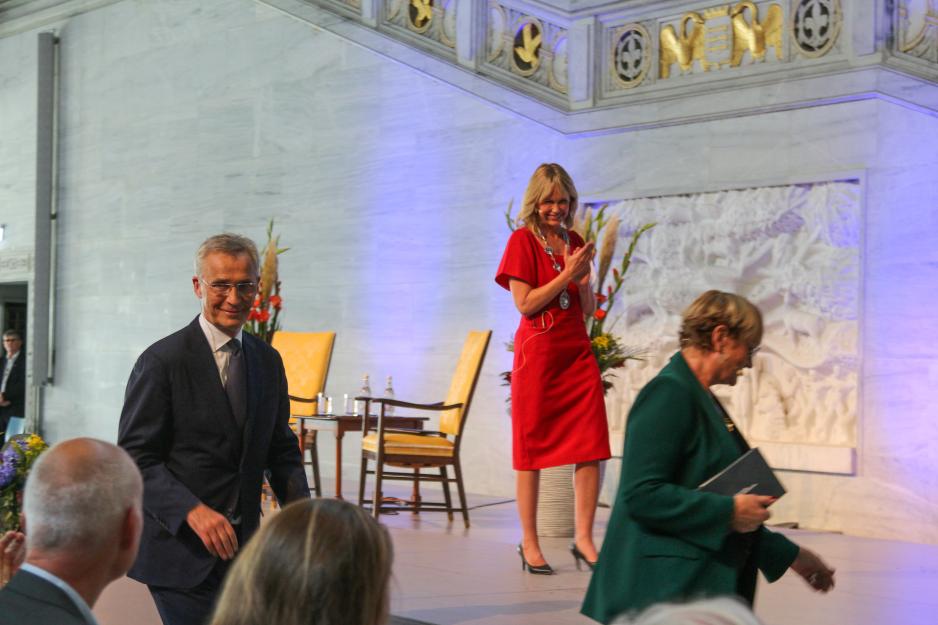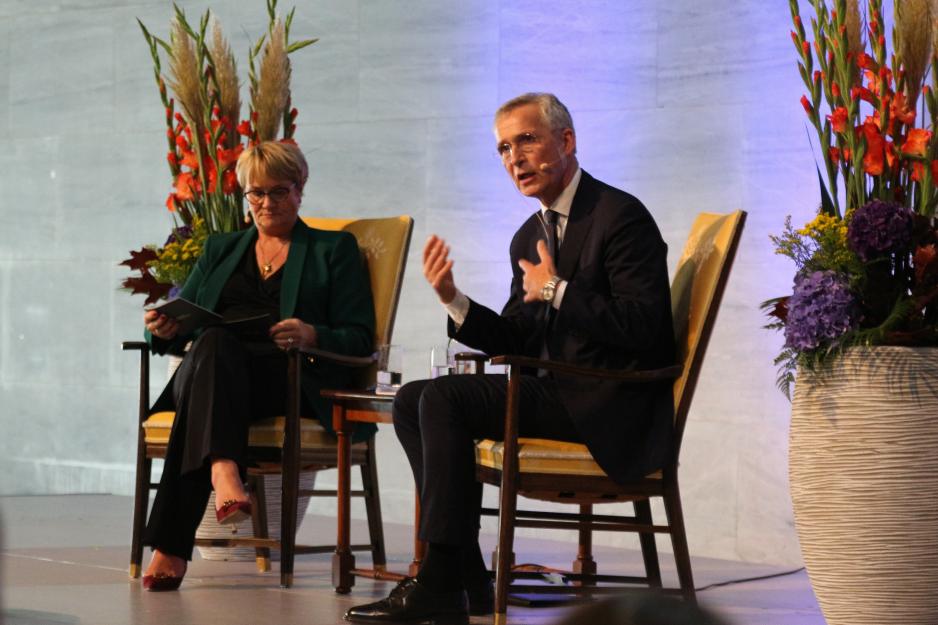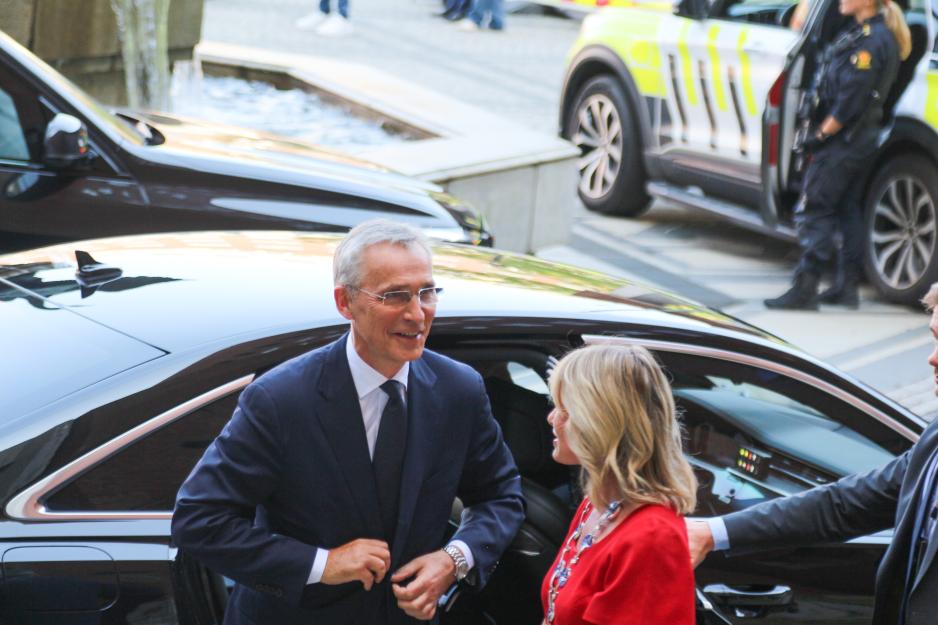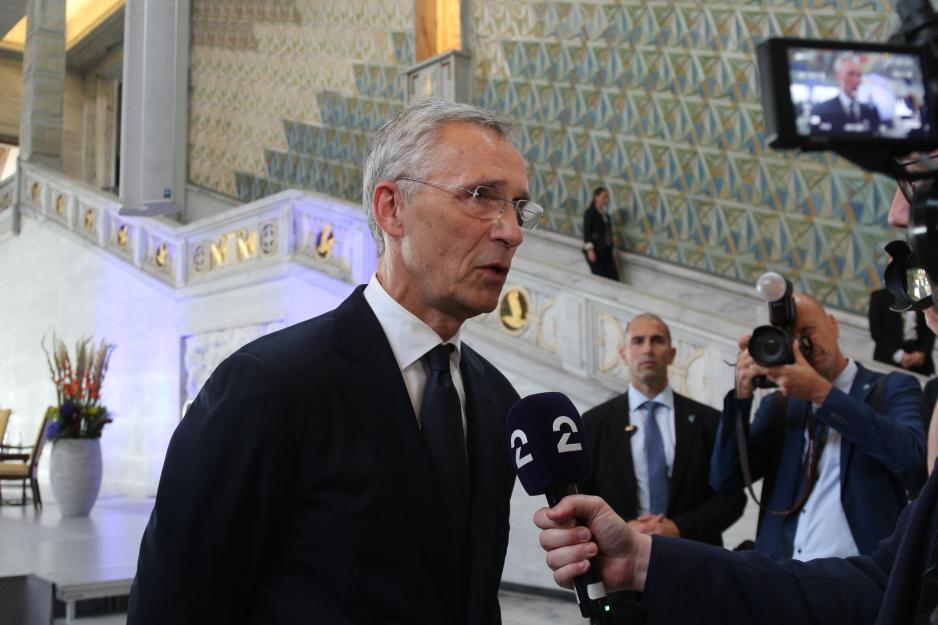Outgoing NATO Secretary General: “The Job Did Not Turn Out as Imagined”

Outgoing NATO Secretary General Jens Stoltenberg was welcomed as a rockstar and received massive applause from the 1,500 attendees in Oslo City Hall on September 5th. He was greeted by Oslo Mayor Anne Lindboe (Conservative). He participated in an hour-long conversation with the Secretary General of the Norwegian Atlantic Committee, Kate Bundt Hansen (to the right). (Photo: Trine Jonassen)
Oslo (High North News): "The world has become more dangerous and unpredictable. The good news is that NATO has become stronger," says outgoing NATO Secretary General, Jens Stoltenberg (65), at his last official meeting in Norway as head of NATO.
Outgoing Secretary General Jens Stoltenberg (65) was welcomed and praised like a rockstar when he entered the stage in Oslo City Hall on September 5th.
1150 people filled the room with roaring jubilation, and a seemingly well-rested and relaxed NATO chief accepted the praise with the comment, "This feels like coming home."
Stoltenberg was in Oslo to end ten turbulent years as the secretary general of the defense alliance and participated in a conversation with the secretary general of the Norwegian Atlantic Committee, Kate Hansen Bundt.
On October 1st, he will have his last day at the NATO headquarters in Brussels.
Not as imagined
Over ten years have passed since Stoltenberg said yes to becoming the new NATO Secretary General just before Christmas in 2023. Looking back at the unrest that followed, he says that the job was not what he imagined.
There was peace in Europe, NATO and Russia had gone from "cold war" to "cold peace" in the early 2000s, and a NATO-Russia council had been established. Barack Obama was the president of the US, and Angela Merkel was the "queen of Europe."
A world that has become more dangerous and unpredictable
Stoltenberg entered NATO on October 1st, 2014. In February 2014, Russia invaded the Ukrainian peninsula of Crimea. In the fall of 2016, Donald Trump won the US presidential election against all odds. In February 2022, Russia's full-scale war against Ukraine was a fact.
The fight against terror has also impacted the global security situation.
The fourth extension
In 2023, US President Joe Biden asked Stoltenberg to continue in the position for one more year because "this is not a time for any uncertainty regarding the leadership of NATO," with the war in Europe and unresolved memberships for Sweden and Finland.
Jens Stoltenberg stayed for the fourth time, but the end has now come.
"Yes, the job was something other than I imagined. What has characterized these past ten years is that the world has become more dangerous and unpredictable," says Stoltenberg and adds playfully:
"Perhaps it is me? Everything was calm before I entered NATO. Perhaps it will be calm when I leave?"
He was rewarded with laughs from the audience.

Secretary General of the Norwegian Atlantic Committee, Kate Bundt Hansen, in conversation with outgoing Secretary General of NATO, Jens Stoltenberg, in Oslo City Hall on September 5th. It is nice to come to Norway and meet everyone here in Oslo City Hall. I feel very at home here," says Stoltenberg. (Photo: Trine Jonassen)
Safe together
Yet, in the middle of all the chaos, NATO has been strengthened, believes the outgoing head of NATO, pointing to the increase in the number of NATO countries spending two percent of their Gross National Product (GNP) on defense from 3 to 23.
"We are safe in NATO as long as we protect the alliance."
Russia grew to become the West's biggest threat during Stoltenberg's leadership. While NATO's eyes were fixed on the Middle East and Afghanistan, Vladimir Putin got comfortable in Europe.
No military threat
"For 40 years, we focused on deterrence against Russia. We had one job: to keep Russia away from Finnmark in Northern Norway, and Europe. And then the cold war was over, and NATO had to find new relevance."
NATO is now back where it started, with Russia as the number one enemy, but now accompanied by China.
However:
"We now see no immediate military threats against a NATO country. The threat comes from terror and hybrid threats," says Stoltenberg.
Also read (the article continues below)
Stoltenberg is careful to make any predictions on the outcome of the Ukraine War.
"It is difficult to predict the course of the war. Experts thought Ukraine would fall in a matter of days, but they were wrong. Whether Ukraine can survive as an independent state is up to us and the support we can provide."
As a young Labor politician, Jens Stoltenberg marched the streets of Oslo to protest against nuclear weapons.
The 65-year-old on stage is still against nuclear weapons and pro-disarmament, but not if the stance is one-sided and the counterpart is a despot who has dismantled all disarmament agreements and nuclear cooperations.
Expired agreements
Is it possible to have new disarmament agreements?
"Even under the coldest war, we managed disarmament agreements, such as the SALT agreements (Strategic Arms Limitation Talks, ed. note).

Mayor of Oslo, Anne Lindboe (Conservatives), greeted Jens Stoltenberg outside Oslo City Hall. In just a few weeks, Stoltenberg will leave his position as Secretary General of NATO after ten years in the Brussels headquarters. (Photo: Trine Jonassen)
The SALT agreements were two rounds of disarmament negotiations and agreements between the Soviet Union and the United States. SALT I occurred between 1969 and 1972, and SALT II between 1972 and 1979.
Expires in 2026
After the SALT agreements, the disarmament negotiations continued, which led to the START agreements (Strategic Arms Reduction Treaty) and the Comprehensive Nuclear-Test-Ban Treaty of 1996.
An extension of the START agreement, New START, was signed by then US President Barack Obama and then Russian President Dmitry Medvedev in 2010 and ends in 2026.
The agreement limits the number of warheads with a nuclear charge to 1,550 and the number of missiles and aircraft to 700 in each of the countries.
Include China
Stoltenberg fears for the future of nuclear cooperation.
Also read (the article continues below)
"The entire nuclear cooperation has withered in the shadow of the war. We must revive them, and the next agreement must include China," believes Stoltenberg.
During NATO's summit in Washington this summer, NATO called China "an enabler of war."
"That was not well-received in Beijing, but we are not here to please China," says Stoltenberg, earning a new round of applause.
He is preaching to the choir now.
Enabling the war
Even though there are politicians in Europe believing the opposite, NATO's 32 member countries agree that China is a crucial factor in Russia's ability to continue its warfare.
Freedom is more important than free trade.
"Remember that China is a dictatorship that violates human rights and is building up an enormous military capacity. We cannot turn our backs on China," the secretary general clarifies.
He agrees that globalization in the eighties greatly benefited the Norwegian export market. Norway profits well from the trade agreements with China. But now we have to choose:
"Freedom is more important than free trade. Trade and politics are not separated from each other," he says, pointing to the flow of Russian gas side by side with the war in Ukraine.
"We must not make that mistake with China."
Two percent is not enough
Although the goal is for each NATO country to spend a minimum of two percent of its GDP on defense, Stoltenberg warns that this is no longer enough.

Jens Stoltenberg met a joint press corps after the open meeting in Oslo City Hall. He was cheerfully met by the audience as he joked that the unrest in the world only started when he entered NATO and that it would perhaps calm down when he left. (Photo: Trine Jonassen)
Two percent is the minimum. Our target is impossible to reach without using more than two percent. Europe must do more for its own security, especially considering the unpredictability surrounding the US presidential election.
He believes that any future "major event" in a country will involve either China or Russia.
Warns against division
Therefore, nothing must create discord in the alliance, such as the talks of a separate defense alliance in the EU.
"I would warn against building alternatives to NATO. Do not mess with this! Stick together and we will be fine."
Stoltenberg is confident that the alliance is in good hands with Dutch Prime Minister Mark Rutte (57), who will take over as head of NATO from October 1st.
Also read (the article continues below)
"Rutte will be an excellent secretary general," says Stoltenberg, who has previously called Rutte a "true transatlantic, a strong leader, and consensus builder."
Not given
Stoltenberg himself is left with a deeper understanding of the importance of the bond between the US and Europe.
"This bond is not a given, and at the beginning of NATO, there were many opponents. NATO now accounts for 50 percent of the world economy. Together, we are safe."
When Jens Stoltenberg steps down as Secretary General of NATO, he is the leader who has served the second longest, surpassed only by the Dutchman Joseph Luns.
Leave from Statistics Norway
Despite the tense geopolitical security situation, the audience in Oslo City Hall was very interested in what the former Norwegian energy minister, finance minister, and prime minister would now spend his time on.
Jens Stoltenberg led NATO well and safely.
Stoltenberg, who cheerfully states that he has been on leave from Statistics Norway since 1990, replies that time will tell.
After the town hall meeting, he was in the audience with the King of Norway and met Prime Minister and party member Jonas Gahr Støre, who thanked NATO's Secretary General for his efforts.
"Jens Stoltenberg has led NATO safely and well through ten turbulent years. On behalf of the Norwegian people and the government, I would like to thank him for his important and good leadership," said Prime Minister Jonas Gahr Støre.
The agenda for the meeting with the Prime Minister included the development of NATO and continued support for Ukraine.
"Russia's brutal war of aggression against Ukraine was a turning point for Europe. Allies have been clear in their support for Ukraine and remain united. Jens Stoltenberg has been an important driving force behind much of this effort," said Støre, who looks forward to working with the new Secretary General.
"I have worked closely with Rutte and am confident that he will continue Stoltenberg's work to ensure allied unity and strengthen NATO's ability to defend its member states," said the Prime Minister






